Tuesday, March 09,2021 / 09:43 AM / by Coronation Research / Header ImageCredit: Currency
Nigerian markets are famous for not correlating with globalmarkets, but recently it has been wise to pay attention to global bond markets.The rise of the US government 10-year bond yield has attracted a lot ofattention over the past few weeks and led to nervousness in certain equitymarkets. The wisdom of taking on e merging market risk in order to escape lowUS bond yields is being questioned. This affects Nigerian Eurobond yields.
FX
Last week the exchange rate in the Investors and Exporters Window(I&E Window) weakened by 0.18% to N411.00/US$1. In the parallel, or street,market the Naira appreciated by 0.41% to close last week at N480.00/US$1. In abid to incentivise the inflow of diaspora remittances the Central Bank ofNigeria (CBN) in its "Thinking-outside-the Box" strategy announced, in a recentcircular to all Deposit Money Banks (DMOs) and International Money TransferOperators (IMTOs), that recipients of diaspora remittances shall receive N5 forevery US$1 received. We recall that, in November 2020, the CBN asked IMTOs torelease US dollars to recipients of remittances and this resulted in theparallel exchange rate strengthening. There are worries that this is atemporary devaluation in disguise, however, due to the N5 incentive. In ourview, such tactics may deliver short-term gains but do not overcome thefundamental difference between the I&E and NAFEX rates on the one hand andthe parallel rate on the other. We expect pressure on the currency to continueover the coming weeks and months.
Bonds &T-bills
Last week, the secondary market yield for an FGN Naira bond with 10years to maturity declined by 37bps to 10.40% and at 7-years declined by 23bpsto 10.10% while at 3-years the yield increased by 108bps to 7.92%. The was theopposite to the trend seen during the last two weeks of February when investorswere rotating their long-dated bonds for short-dated ones (maturities under5-years): clearly, some investors now believe that long-dated bonds have value.The annualized yield on a 328-day T-bill remained unchanged at 2.07% in thesecondary market while the yield on a 326-day OMO bill rose by 76bps to 9.72%.On Monday last week the CBN announced a roll-over of its N4.1 trillion(US$9.9bn) of Special OMO bills paying 0.5% interest to banks in respect oftheir excess Cash Reserve Ratio (CRR) held by the central bank, the excessbeing the sums over the official 27.5% ratio. One effect of this is to keep theoverall CRR position high, in our view, with a question mark over overallliquidity in the private-sector system. Overall, we think that bond and T-billrates are likely to continue trending upwards over the coming weeks and months.
Oil
The price of Brent crude rose by 4.88% last week, closing atUS$69.36/bbl, a 33.90% increase year to-date. The average price to year-to-dateis US$59.52/bbl, 37.73% higher than the average of US$43.22/bbl in 2020. TheOrganization of the Petroleum Exporting Countries and Russia, known as OPEC+,met last week to discuss progress of its production limitation agreement. OPEC+agreed to stick, broadly speaking, with its scheduled output cuts despiterising crude prices which themselves are encouraging marginal players to stepup production. Over the weekend Houthi forces in Yemen fired drones andmissiles at Saudi Arabian installations, including a Saudi Aramco facility atRas Tanura that is vital to petroleum exports. The terminal is capable ofexporting about 6.5 million barrels a day, almost 7% of global demand. It isthe most serious attack on Saudi oil installations since a key processingfacility and two oil fields came under fire in September 2019. Our view is thatthe OPEC+ agreement will keep oil prices above US$65.00/bbl over the coming weeks.
Equities
The Nigerian Stock Exchange All-Share Index (NSE-ASI) fell by 1.18%last week with a loss of 2.33% year-to-date. BUA Cement (+3.82%) and Seplat(+1.87%) closed positive last week, while Ardova Oil (-25. 21%), Oando(-23.19%) and Sterling Bank (-14.04%) closed negative. Our view is thatinvestor sentiment continues to be weak and we note that in certain majorstocks there is quite low turnover, although turnover remains strong in thebanks. Certain mid-cap stocks, that performed well in the first part of thisyear, are losing their lustre now. See Model Equity Portfolio on page 4.
The US 10-Year Bond and Nigeria
The US 10-year government bond yield is unsettling global markets.The yield on this normally obscure instrument rose from 0.72% per annum sixmonths ago to 1.57% at the end of last week. This may not appear to be aprofound change, but it is having effects -sometimes dramatic - on marketsaround the world. The market in Eurobonds issued by the Federal Government ofNigeria (FGN) is no exception.
For over a decade, investors in risky assets have enjoyed thebenefits of low US, Yen and Euro interest rates, not only in terms of loweringtheir cost of funds (if they borrow) but in terms of the implied valuations ofequities. In developed countries policy makers have treated inflation as beingtoo low, rather than too high. And yet US President Joe Biden's introduction ofa US$1.9 trillion (N779.0tn) stimulus package has, finally, awakened fears thatrenewed economic growth will increase inflation. Hence the rise in US bondyields.
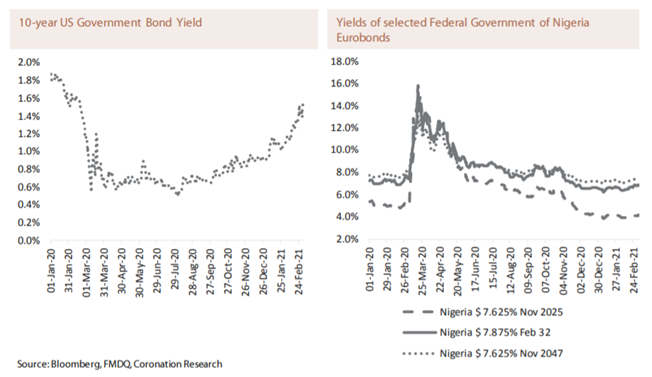
Global equity markets are jittery. For example, the Nasdaq index oftechnology stocks fell by 6.9% in the second half of February and has fallen afurther 1.5% so far in March. These are not large falls in the context of thehuge rally in this market over the past five years (the Nasdaq rose 178.7% overthis period), but they are corrections, nevertheless. There have also beenprice falls in FGN-issued Eurobonds. The yield of the FGN 2032 Eurobond hasrisen from 6.44% to 6.86% over the past three weeks.
The narrative behind emerging market Eurobonds, until recently, hasbeen one of rising prices and yield compression. The argument was that, withlow interest rates in the US, there were so many US dollars looking for yieldthat investors would have to buy assets like Nigerian Eurobonds. Indeed, it wasfrustrating for Eurobond analysts that, whatever the fundamental features ofNigeria and of similar countries, yields just kept on coming down. Theexception to this, of course, was the panic-induced sell-off of almost exactlya year ago (see chart, above) when yields shot up during the first wave of theCovid-19 pandemic. But wise investors knew not to sell at this time.
The situation is different now. If US bond yields are rising thendifference between US dollar yields and FGN Eurobond yields is getting less,which weakens the justification for buying and holding them. Another effect hasbeen the reduction in the spread, which has narrowed over the past few years,between FGN Eurobond yields and the corresponding (in terms of duration) USgovernment dollar bond yield, the so-called Z-spread.
Infact, it is possible to look at these two factors separately. In the chartbelow we present the Z-spreads over the past two years for selected FGNEurobonds. In the table we present the average Z-spread during the year leadingup to the crisis (we identify the start of the crisis on 4 March 2020) andpresent this as a target Z-spread for each bond. Then we present the Z-spreadat the end of last week. The difference between the two shows the potential forthe current Zspread to revert to its average, in terms of additional yieldexpressed in basis points.
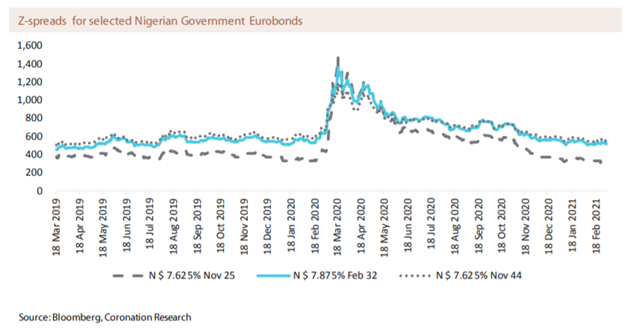
What this shows is that for one of our three selected bonds, theFGN November 2025, the Z-spread has tightened a lot (63 basis points) over itsaverage, suggesting some potential yield rises if the Z-spread reverts to itsaverage. But, for the other two bonds, the FGN February 2032 and the FGNNovember 2047, the Z-spread compression is less of a problem. In other words,investors should worry less about the tightening of the spread of FGN Eurobondsover US government bonds and worry more about the direction of US bond ratesthemselves.
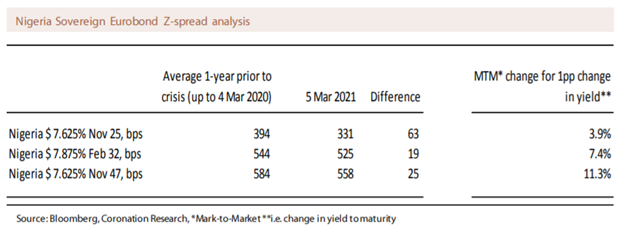
The final column in the table presents Bloomberg's assessment of thepotential mark-to-market change in the value of each bond for a one percentagepoint change (1pp, or 100bps) change in its yield to maturity. As one wouldexpect, the longer the duration, the more potential for change. For someinvestors, who hold the bond for yield, the mark-to-market price is of littleconsequence (unless they intend to trade). For other investors, themarkto-market price must be reported regularly, and the implications of risingUS rates could be quite severe on portfolio valuations.
As a final point, we look at this situation not from the point ofthe investor, but from the point of view of the issuer, the FGN. The FGN wasabsent from new-issue market in 2019 and in 2020. If US government bond ratescontinue to rise it may not want to issue in 2021, either. This could result inthe FGN not issuing Eurobonds for three straight years 2019-21. This would beexceptional and, ultimately, could make Nigerian Eurobonds scarce in themarket.
ModelEquity Portfolio - 5 March 2021
Last week the Model Equity Portfolio fell by 0.39% compared with afall in the Nigerian Stock Exchange All-Share Index(NSE-ASI) of 1.18%, therefore outperforming it by 79 basis points. Year todate, it has lost 1.12% against a loss in theNSE-ASI of 2.33%, outperforming it by 121bps.
Last week our notional positions in five bank stocks took back acombined 10bps from the 49bps which they had earnedthe previous week. Bank stocks are not entirely the safe haven they have beenfor much of the year, take note.
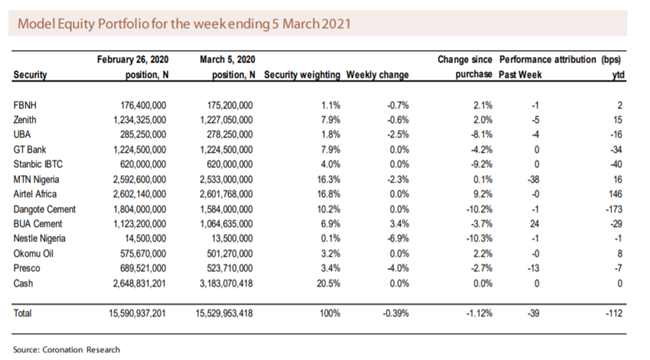
As we forewarned our readers last week, we made notional sales ofindustrial stocks last week in order to take our notional cash position up tojust over 20.0%. While doing this we noticed that, even for a small modelportfolio such as ours, it was very difficult to find liquidity in AirtelAfrica, despite this stock being 16.9% of the NSE-ASI. So, if we encounterliquidity this week we intend to make use of it.
For most of the time we try not to predict the overall direction ofthe market, unless we have a very strong idea of its next move. However, theequity market does seem weak at the moment, partly as a result of marketinterest rates rising, and we think it is reasonable to take more of ournotional equity positions off the table. Our notional sales of equities thisyear have saved us 60bps so far. This week we intend to add a further 5percentage points to our notional cash position and will make notional salesamong banks stocks as well as industrial stocks to achieve this.
Relatedto Coronation
1. T-Bill Rates HeadingTowards 10.0%
2. Q42020 GDP and the Implications for Markets
3. Eurobondsand Foreign Financing
5. NigerianGDP Better Than Thought
9. Oil Above US$50.00 per Barrel
12. CBN Likely to Leave MPR at 11.50%
13. Second-best Equity Market in the World
14. TheBiden Effect
15. US Dollar Eurobond Yields Now HigherThan Naira Yields?
16. Fiscal and Monetary Response toEvents
17. Winners and Losers in Africa
18. The Return of the Equity Market
19. Which Way for Interest Rates?
20. Coronation Research Releases Report Themed: From Savings toMutual Funds
21. A Case of Eurobond MarketContagion
23. The Policy Mix and The Markets
24. The Oil Price and ProductionParadox
25. Cracks In The Bond Market?
26. No Big Change in FX Policy
27. Coronation Research Releases Outlook for Insurance Sector -From Lagoon To The Blue Ocean
28. Micro-Insurance, Tech, Key toDeepening Nigeria's Insurance Sector - Coronation Research
29. Navigating the Capital Market:The Investors' Dilemma
30. Market Interest Rates Back Up- Coronation Research
Related News
1. Total Trade Higher By8.9% in Q4 2020, Lower By 10.3% in FY 2020
2. Nigeria Needs toReposition Its Manufacturing Sector for Growth In 2021
3. CBN Restates Supportfor Manufacturing Firms in Nigeria
4. Point of Inflection -Sustainable or Not? - LBS Executive Breakfast Session - March 2021
5. February 2021 HeadlineInflation May Jump to 17.27%
6. PMI Reading No 95:Above Water Again
7. Dangote Refinery: APanacea to Nigeria's Petrol Import?
8. Temporary Improvementon the Services Account in Q3 2020
9. CBN Governor PledgesAccommodative Monetary Policy to Spur Economic Growth
10. Economic Recovery:Osinbajo Gives Kudos to Economic Managers for their Foresight
 Lagos, NG • GMT +1
Lagos, NG • GMT +1











 1344 views
1344 views




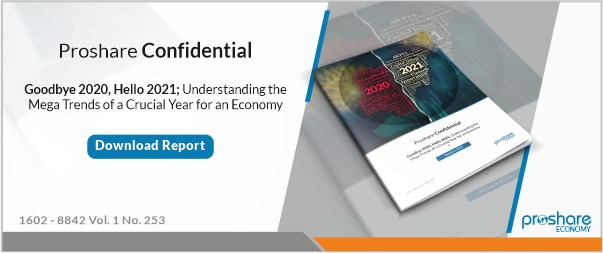
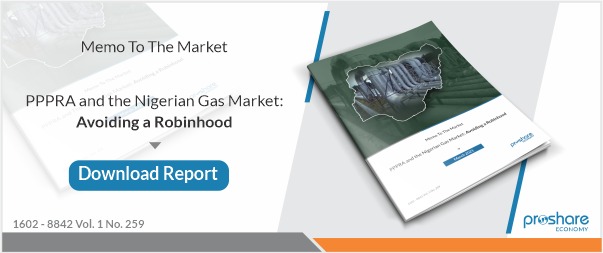





 Sponsored Ad
Sponsored Ad
 Advertise with Us
Advertise with Us









